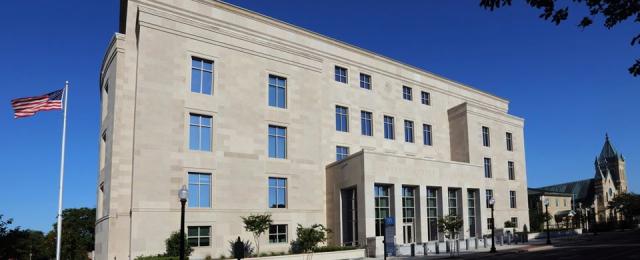An Air Force veteran and former civilian employee was indicted this week for leaking classified information on USAF aircraft and weapons.
The U.S. Attorney’s Office for the Northern District of Florida announced the grand jury indictment of Paul J. Freeman on June 27, after Freeman had been arrested and made his initial appearance in federal court.
Federal officials allege Freeman “transmitted classified national defense information about United States Air Force aircraft and weapons to people not authorized to access the information” repeatedly in 2020 and 2021. A nine-count indictment states Freeman shared information “related to the vulnerabilities” of U.S. Air Force aircraft and weapons.
Freeman is scheduled for a detention hearing on July 1 at the United States Courthouse in Pensacola, Fla.
An Air Force spokesperson identified Freeman as a retired lieutenant colonel and developmental engineer who entered service in 1975 as an enlisted Airman, was commissioned an officer in 1984, and retired in 2003. His last active duty station and title was operations officer with the 46th Test Squadron at Eglin Air Force Base, Fla., which is nearby his listed residence Niceville, Fla.
Freeman appears to have rejoined the service as a civilian after retiring. Records from a separate court case in 2019 indicate an individual identified as Paul J. Freeman of Niceville, Fla., was hired as a civilian in 2003 as an engineer at the Air Force Research Laboratory. The Air Force could not confirm if the two cases involve the same individual. The Department of Justice declined to release any further information beyond its release and indictment.
According to court records of the 2019 case, Freeman sought court relief after the Air Force fired him from his job in AFRL’s munitions directorate. The records show Freeman was involved with a Special Access Program, meaning it fell into a class of highly classified programs with extra safeguards and controls. Working on that program from 2007 to 2012, the records say, Freeman “sent two emails with classified information from his personal computer … to unauthorized recipients, including several news outlets, government agencies, public officials, and military commanders who were not cleared to receive such information.” The records say Freeman refused to report to his worksite following a 10-day suspension.
Special Access Programs require individuals to sign nondisclosure agreements and follow other protocols.
Freeman did not contest that he sent the emails, according to court records, but argued in his appeal that his disclosures were covered by the Whistleblower Protection Act of 1989, and said he refrained from returning to work because he feared for his safety. A panel of judges from the federal circuit of the U.S. Court of Appeals denied his appeal, ruling that Freeman neither qualified for whistleblower protections nor faced any danger in returning to work.
The unauthorized disclosure of classified information remains a major concern among military and national security leaders. Just this week, the commander of U.S. Cyber Command, Gen. Timothy D. Haugh, raised alarms about China’s continued efforts to exfiltrate technological secrets from U.S. defense contractors, for example. And the ongoing case of Airman 1st Class Jack Teixeira, an Air National Guardsman alleged to have shared hundreds of top secret and classified documents to online chatrooms via his Discord screen name and persona, prompted the Pentagon to undertake several reviews of its security programs and how it tracks insider threats.
At the same time, officials have warned that China is seeking to recruit U.S. military pilots and operators to train their own aviators and to gain insights into American tactics, techniques, and procedures. The Office of the Director of National Intelligence issued a bulletin earlier this month warning of such moves, and in February the Air Force warned that the Chinese are recruiting U.S. “pilots, maintainers, air operations center personnel, and a variety of other technical experts” to build up their expertise.
